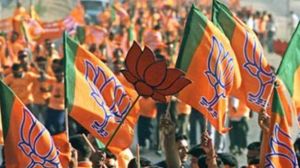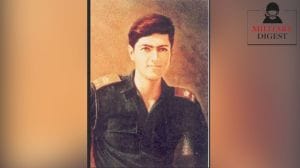Mangalores metamorphosis
Beer is proof that God loves us and wants us to be happy,says a poster quoting Benjamin Franklin adorning the walls of Froth on Top Pub...
Beer is proof that God loves us and wants us to be happy,says a poster quoting Benjamin Franklin adorning the walls of Froth on Top Pub and Café,a traditional wood and tile house thats largely a student hangout in downtown Mangalore. There are only two girls among the 20-odd people at the pub. They rest uneasy,imploring their male colleague to leave soon. Talk around the pub,especially around the chairs with college bags hanging on them,is about what happened last Saturday.
On January 24,a part of the moral police in Mangalore,the Right-wing Hindu outfit known as the Sri Rama Sene,with a sympathetic BJP Government in power,put fear in the hearts of pub-going students with a violent attack on girls at a relatively new lounge bar,Amnesia. Television images of the attack are still fresh in everybodys mind.
Girls,aged between 19 and 20,were grabbed by their hair,thrown on the ground,molested,slapped and beaten by a group of young men,claiming allegiance to Hindu culture and accusing the girls of dancing with boys at the bar.
On a typical Saturday afternoon,Froth on Top would be teeming with college students boys and girls. This week its almost empty like other pubs in the area.
On Saturdays,we are usually full. Since the attack last week,most pubs have emptied out. Our clientele is mostly students,but they have all stopped coming, says an 18-year-old Hindu boy from rural Mangalore who is employed as a waiter at one of the pubs.
The Sri Rama Senes state convener,28-year-old Prasad Attavar,who was arrested and later released on bail,claimed that the attack was a spontaneous reaction to the destruction of Hindu culture.
There were conspiracy theories floated by the district administration,including the police,that the attack was about a failed extortion bid,that underworld elements connected to the Congress were allegedly involved,that the pub attackers were largely hired goons parading as Sene men to bring the BJP and Sangh Parivar into disrepute.
But talk to hardcore Sangh or Sene activists and it becomes clear that the attack was carefully thought out and executed like the church attacks of 2008 and several incidents of moral policing.
These girls come from all over India,drink,smoke,and walk around in the night spoiling the traditional girls of Mangalore. A girl from Punjab was drugged,raped,and killed last month. There was no hue and cry then. Why should girls go to pubs? Are they going to serve their future husbands alcohol? Should they not be learning to make chapattis? Bars and pubs should be for men only. We wanted to ensure that all women in Mangalore are home by 7 pm, says Pravin Valke a 40-year-old,fifth-standard drop-out,who is a founding member of the Sri Rama Sene.
You think the boys didnt know what they were getting into. They did it in broad daylight,before TV cameras. Dont you think every girl will now think twice before entering a pub? The strategy was a success, says Valke.
According to Valke,the pub attack and assault on girls were intended to send a warning to youths in Mangalore,especially those who come from outside to study in citys colleges and other institutions,and to tell the people of the city that the local culture is well protected.
One of his associates boasts of an incident where they made some girls urinate in their pants after threatening to beat them up for going around with boys from other communities. No one dares to tease girls. No one plays loud music in cars around colleges, he says.
Nearly 70 per cent of Mangalore lives in small,traditional middle class homes. Everywhere women are telling us that the Sene boys did the right thing. Only those who live in flats seem to be upset, says Valke.
According to 25-year-old Shekhar,who belongs to a Sangh Parivar group,No case will stand against the boys who attacked the pub. The Sangh will stand firm behind the boys,providing all the support they need. After the church attacks last year Christian conversions have reduced. The Sangh does not do anything without methodical planning, he says.
For many upper caste Hindu families living in the middle class,lower middle class homes that Valke talks about,the Sangh Parivar has over the last 50 years managed to become a support system. With the BJP in power,the Sangh Parivar activists,who had for years seen stagnation,are now seeing growth and are reportedly being given important positions. Alleged injustices of the past like murder accused Muslim youths being set free during Congress regime or Christian institutions preventing children from wearing Hindu symbols are being addressed,says Shekhar.
Strangely,if theres any place in Karnataka where social drinking by women has been part of the culture,it is in coastal Mangalore and hilly Kodagu.
In the Mogaveera fishing community,women have been traditionally known to visit toddy shops. There is a large toddy tapping community. Among the Christians,who have roots linked to the Portugese,even some grandmothers drink socially, says Vidya Dinkar of the Citizens Forum for Mangalore Development.
Pubs have been around Mangalore since the early 1990s,while bars and wine stores have been around for decades.
I have not been to a pub,but what if other women want to go. Ban it if it is bad. But dont have different rules for men and women, says Prof Rita Noronha from the Peoples Movement for Enforcement of Constitutional Rights and Values.
Things have been changing visibly,but subtly in what was once perceived to be a cosmopolitan,progressive,enterprising,education oriented,banking and finance oriented largely prosperous and adaptive Mangalore society.
In the last four years,churches have been attacked,Hindu-Muslim clashes have led to three-day curfews,and moral policing and intolerance in general has been on the rise. Subtle changes are taking place too,all connected to the regional fortunes of the two political parties the rise of the BJP and Right-wing groups and the fall of the Congress over the last two decades in particular. Scores are being settled both old and new not merely political but also religious and cultural,bringing to the fore fault lines that were blurred until now.
Many of the traditional ties that existed in society have broken down. In the past,jasmine flower grown on a Christians farm was bought by a Muslim trader and sold to Hindu women. The breaking of ties has created a vacuum for exploitation by groups that indulge in divisive politics, says Vidya Dinkar.
While the RSS has had a long history in Mangalore,analysts point out two other crucial socio-political events in the regions recent history that has resulted in the rise of the Right-wing. The initiation of land reforms by the Congress in 1974 resulted in powerful land holders from the Bunt community gravitating away from the Congress. This further accentuated during the period after the Emergency when the Congress sought to divide the polity on caste lines by propping up backward caste communities and minorities. The demolition of the Babri Masjid in 1992 by the Sangh Parivar drove a wedge in the already existing but not very visible communal fault lines.
In the last three years,on the back of its new-found political power in Karnataka through the BJP,and with over five decades of work in building a strong,disciplined,cadre base through education system and youth initiatives,the Sangh Parivar claimed to have reached a critical threshold,sufficient to control Mangalore for a long time. There is a nearly 60 per cent penetration into Hindu society by the Sangh in Mangalore. It was relatively easy in Mangalore,compared to the rest of Karnataka due to the high education levels and a long history for the Sangh, says a Sangh member.
The numbers in student unions linked to the Right-wing ABVP and Sene are swelling in the colleges of Mangalore University. Simultaneously,there is also a rising feeling of distrust among the three major communities the Hindus,Muslims and Christians who share the demographics of the city. And unlike the Right-wing groups,civil society and mainstream political parties have not been able to organise themselves.
The police,media,and administration seems to have donned the saffron colour since the BJP tasted power, says 76-year-old renowned Muslim writer Sara Aboobacker,one of the first educated women from the Muslim community,who has lived in Mangalore for the last 50 years. There is Hindu Talibanisation and there is Muslim Talibanisation. Fundamentalism is on the rise among the Muslims,especially after the arrival of the Jamait-i-Islami. Muslim boys go around forcing girls to wear burqas. These are individual decisions. Who are these people to dictate what should be done? It is the Indian Constitution that should be followed, she says.
The overhanging distrust is leading to fewer Muslims living in Hindu areas and vice-versa. I will not get a flat in any of the new buildings that are coming up in this area. We tried for a flat for a relative,but were turned down when they came to know about our religion, says the writer whose old style house has towering flats on both sides.
There is great distrust among the communities. There was a time when people visited each other,had friends across communities and lived peacefully. Today,even Christian youths want to raise a unit to protect churches, says William DSouza,a local businessman.
The only communication these days between communities is among the very rich and the very poor and not among the middle class, says Sara Aboobacker.
Suryaprakash Bhat,a former Rotary district governor and chartered accountant,however,disagrees and emphasizes on the fact that Mangalore still retains much of its old qualities. Nearly 60 per cent of people owe their education to the minority Christian institutions. We can never imagine organising attacks on our alma mater. These are a handful of rowdy elements and the civil society is capable of giving them a sound reply, he says.
After the church attacks,it took the Christian groups over a week to get boys who were arrested on charges of rioting all of them first-time offenders released on bail,says Isaac Vaz,a Catholic church activist and businessman. In the pub attack case,despite severe charges being pressed,the Sri Rama Sene men have got bail easily. All this is contributing to an uneasy peace, he says.
Sara Aboobacker narrates the account of a Muslim youth who was arrested in a murder probe without any case being booked against him,was kept in custody for a week and was allegedly tortured by the police. Nobody reported it, she says.
Sangh Parivar activists argue that what is happening now is a turnaround on what happened during the Congress rule. On a single telephone call from Muslim ministers,people accused of murder were released in the past, alleges a Sangh member.
The insecurity is the reason that despite the televised visuals of the pub attack,none has come forward to physically identify the attackers. All the girls who were there that day are scared of being branded for life, says S Shetty,a member of the dominant Bunt community and the mother of a close friend of one of the girls who were beaten up at Amnesia. For Shetty as a mother who knew her daughter visited pubs and hung out with boys,the attack is another example of the difficulties a woman has in living in a male dominated society. I am from a generation that managed to get some amount of economic independence. That was because my mother lived in a very conservative environment and was beaten up by my father. She gave us freedom to stand on our own feet. I have given my daughter much more liberty to help her learn to cope with the modern world. Its not a crime for girls to go to pubs with boys. She knows her limits and I dont allow her to behave irresponsibly, she says.
According to her,there is a level of class resentment,especially among boys of the same age group as the girls who were attacked at the pub. Upper class women are perceived as arrogant who deserve to be subjugated. The girls were doing what a man is doing spending money,showing signs of freedom,and hanging out in a posh locality, she says,accusing politicians of exploiting caste,class,and religious differences. The seed of distrust has been sown. We have been divided, she says.
Despite all the undercurrents of fear,intolerance,bias,and violence sweeping around,there is one constant in Mangalore a soft,warm,respectful,refined and endearing way of using the spoken language avoiding singular terms and preferring respect. We dont want our kids to grow up addressing anybody in the singular. We want them to respect everybody. Thats a feature unique to Mangalore, says Shetty.
Beating girls is not Hindu culture. For me,my culture stands for understanding and feeling for others. Look after your own wives and children, says veteran Mangalore actor and English professor G K Govind Rao.
The Sangh Parivar obviously does not agree with him. No one thinks of the future shape Bharat will take if the Hindu culture is not protected, says a Sangh activist.
- 01
- 02
- 03
- 04
- 05































